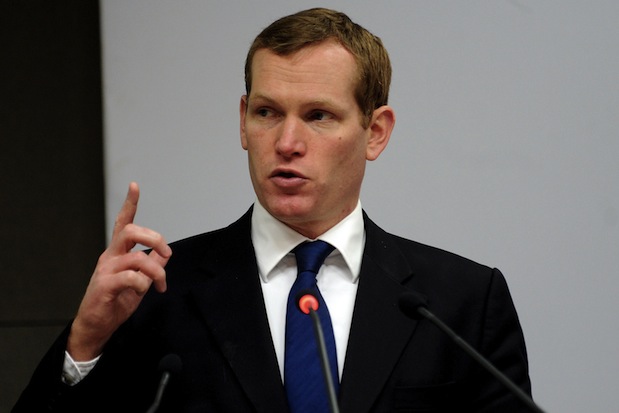Conviction politics is back. The two men making the political weather at the moment, Alex Salmond and Nigel Farage, both serve their politics neat. They have no interest in any ‘third way’. They stand for big, simple, defining ideas. They are both far closer to success than the establishment ever imagined they would be.
Now the Liberal Democrat Jeremy Browne is trying to apply this outsiders’ formula to mainstream politics. Sacked as a minister six months ago by Nick Clegg, he is setting out the case for pure, unadulterated liberalism. His new book, published this week, is a deliberately bracing read. It is full of dire warnings about what will happen to Britain in ‘the Asian century’ if it does not reform. He calls for school choice for every parent, the abolition of the 45p tax rate and a much more open immigration system.
The book is the first sally in the war for the soul of the Liberal Democrats. It is clear that Browne intends to be a contender in any post-Clegg leadership battle. This is not the work of someone prepared to let the Lib Dem left take over or have the fudge-and-budge middle of the party win out.
Browne has long occupied a distinct place among Liberal Democrats. He is on the liberal rather than the social democratic wing of the party. His appearance makes many in the party suspicious of him; they feel that he looks like a Tory. With his sombre suits, tightly tied ties and polished shoes, he doesn’t conform to the Lib Dem stereotype — although his sartorial style is more a rebellion against his education at the bohemian boarding school Bedales than anything else.
One would have expected Browne to flourish under Nick Clegg’s leadership, given that they are both from the liberal wing. Certainly, Browne regarded himself as an intellectual outrider for Clegg. He embraced coalition and the idea of the Liberal Democrats as a governing party with an enthusiasm that few colleagues could match. Then he was sacked.
Quite why Browne was dismissed remains shrouded in controversy. Clegg’s henchmen whisper that Browne was lazy. Those close to him say he was pushed for not picking fights with the Tories. His dismissal, they say, was part of Clegg’s appeasement of the left of the party.
Browne’s response to losing his job was to go off and write his own political manifesto. Its title, Race Plan is a deliberate nod to David Cameron’s warning that Britain is in a global race. But it would be wrong to read the book as an application to join the Tory party. Rather, it is a statement of what an authentically Liberal party would stand for. Few Tories would be prepared to endorse, at least publicly, Browne’s view that it was right not to impose restrictions on Polish immigration to Britain.
Those close to Clegg view Browne’s political approach as unrealistic. They argue that whatever the intellectual appeal of his defined and robust liberalism, it would be politically suicidal for the party. Its voters are split evenly between those who favour coalition with the Tories and those who would prefer to govern with Labour. Adopting the Browne position, which would effectively rule out any deal with Labour — hardly a chapter goes by in the book without Browne taking a swing at Ed Miliband — would cost the Liberal Democrats half their support.
They also doubt whether Browne’s internal strategy can work. Their view is that Clegg is as right-wing as you can be and still win a Lib Dem leadership contest. The number of Lib Dem MPs to the right of him is, they say, a ‘tiny sliver’.
But there are reasons to think that Browne does have a realistic chance of winning the argument about the party’s direction. The first is that the Liberal Democrats have changed since Clegg won the leadership in 2007. Four years of austerity government with the Tories has altered both how the public see the Liberal Democrats and who the Liberal Democrats are.
After this stint in office, the Liberal Democrats will not be able to return to their former position of being left of Labour. Cuddly oppositionism is no longer an option. It is also doubtful whether that is what the party membership would want. Since 2010, left-wing members have quit, while economic liberals have joined the party in considerable numbers. Certainly, Lib Dem party conferences have a very different feel than they used to. The beard and sandals brigade is in retreat. The conference bars are now occupied by young, professional types.
When Clegg does go, there’ll be a left-wing candidate to replace him — most likely, party president Tim Farron — and plenty of contenders from the middle of the party. The Energy Secretary, Ed Davey, is clearly preparing to run. Tory ministers complain that he is so keen to preserve his brand within the Liberal Democrats that he is the obstacle to coalition compromises on energy policy. Danny Alexander, the Chief Secretary to the Treasury, who is a far more confident media performer than he was a year ago, is becoming a viable candidate as the economy recovers. As Clegg’s closest Cabinet ally, he is the obvious continuity choice. Jo Swinson, the consumer affairs minister who is currently on maternity leave, can also not be ruled out. In contrast, there will be a gap on the right which Browne could fill.
The Deputy Prime Minister’s circle have long regarded being in government after the next election as essential, not just to preserve Clegg’s leadership but to change the culture of the Liberal Democrats for good. They believe that ten years in office will force the party to abandon easy oppositionism.
But the bigger question is what the Liberal Democrats should stand for. At the moment, the Clegg strategy is to portray the party as a restraining influence on both main parties: they will make the Tories behave in a fair manner and force Labour to be fiscally responsible. This approach can get them through the next election campaign. But at some point the Liberal Democrats are going to need their own agenda. Browne has just stolen a march on his rivals.
Got something to add? Join the discussion and comment below.
Get 10 issues for just $10
Subscribe to The Spectator Australia today for the next 10 magazine issues, plus full online access, for just $10.
You might disagree with half of it, but you’ll enjoy reading all of it. Try your first month for free, then just $2 a week for the remainder of your first year.















Comments
Don't miss out
Join the conversation with other Spectator Australia readers. Subscribe to leave a comment.
SUBSCRIBEAlready a subscriber? Log in